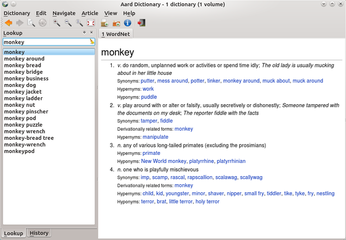Aard Dictionary: Reference Tool for Linux Desktop and Android

Productivity Sauce
Need a dictionary tool that works equally well on a Linux desktop and Android devices? Consider Aard dictionary. This is a rather competent dictionary tool that can handle humongous references like an offline version of Wikipedia with aplomb. Aadict can also manage multiple references and dictionaries, so you can look up a word in multiple sources at once. The application uses its own aar format, and the project's website offers tools for compiling dictionaries. But before you get your hands dirty building your own .aar files, you might want to check the selection of ready-made dictionaries, which include the ever-popular WordNet dictionary, an assortment of Wikipedia files, Wiktionary dictionaries, and much more.
Aard Dictionary binaries are available for Ubuntu and other platforms. Alternatively, you can install Aard Dictionary from source. To do this on Ubuntu, install the python-pyicu package, grab the latest source code release from the project's website, and unpack the downloaded archive. Switch to the resulting directory in the terminal and execute the sudo python setup.py install command. You can also launch Aard Dictionary without installing it using the run.py script. Once the application is up and running, press the Add dictionaries button to add individual dictionary files, or use the Add dictionary directory button to point Aard Dictionary to a directory containing dictionary files. Type then the desired word in the Lookup field to view the results from the added dictionary files.
The Android version of Aard Dictionary is available on Google Play. During the first run, the app automatically scans the default locations and adds the found dictionary files. The app's interface is bare-bones, but it gets the job done.
comments powered by DisqusSubscribe to our Linux Newsletters
Find Linux and Open Source Jobs
Subscribe to our ADMIN Newsletters
Support Our Work
Linux Magazine content is made possible with support from readers like you. Please consider contributing when you’ve found an article to be beneficial.

News
-
Keep Android Open
Google has announced that, soon, anyone looking to develop Android apps will have to first register centrally with Google.
-
Kernel 7.0 Now in Testing
Linus Torvalds has announced the first Release Candidate (RC) for the 7.x kernel is available for those who want to test it.
-
Introducing matrixOS, an Immutable Gentoo-Based Linux Distro
It was only a matter of time before a developer decided one of the most challenging Linux distributions needed to be immutable.
-
Chaos Comes to KDE in KaOS
KaOS devs are making a major change to the distribution, and it all comes down to one system.
-
New Linux Botnet Discovered
The SSHStalker botnet uses IRC C2 to control systems via legacy Linux kernel exploits.
-
The Next Linux Kernel Turns 7.0
Linus Torvalds has announced that after Linux kernel 6.19, we'll finally reach the 7.0 iteration stage.
-
Linux From Scratch Drops SysVinit Support
LFS will no longer support SysVinit.
-
LibreOffice 26.2 Now Available
With new features, improvements, and bug fixes, LibreOffice 26.2 delivers a modern, polished office suite without compromise.
-
Linux Kernel Project Releases Project Continuity Document
What happens to Linux when there's no Linus? It's a question many of us have asked over the years, and it seems it's also on the minds of the Linux kernel project.
-
Mecha Systems Introduces Linux Handheld
Mecha Systems has revealed its Mecha Comet, a new handheld computer powered by – you guessed it – Linux.

